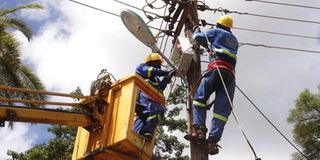State to extend IPP contracts in deal to lower power costs

Kenya Power staff at work in Nyeri. The Energy and Petroleum Regulatory Authority has announced that a 15 per cent reduction in electricity costs.
The state plans to extend the contracts of independent power producers (IPPs) in a sweetener deal to allow them to reduce electricity tariffs in what could lead to lower electricity bills.
The Ministry of Energy had sought to convince the power producers to lower their tariffs by the end of March, but the firms fought back, leading to an impasse that has delayed the process. Energy Cabinet Secretary Monica Juma yesterday announced that the government had finally made a breakthrough in talks with the power firms that will see some of them get contract extensions in exchange for tariff cuts.
This means while the firms will reduce their power tariffs, they will get extra years to run beyond the tenure of their current power purchase agreements (PPAs) with Kenya Power to recoup cash foregone through the tariff cuts. “All options are on the table, so, yes, there is a possibility to extend [the tenure of] some of these PPAs but also to reduce some of them,” said CS Juma.
“We are treating each PPA individually on a case-to-case basis.”
The CS said the government had already struck an agreement with three small renewable IPPs to reduce their tariffs. She added that the state had also reached a preliminary agreement with four large power firms to lower their tariffs over both the short term and long term. Most PPAs run for between 20 and 25 years. Extending this tenure could see some of them last beyond 30 years.
Large IPPs that supply power to Kenya Power include Lake Turkana Wind Power, OrPower 4, Rabai Power, and Thika Power. Others are Kipeto Energy, Garissa Solar Power Plant, Iberafrica Power, and Triumph Power.
“So far, three IPPs operating in the variable renewable energy realm have signed up to lower tariffs that were in line with our expectations. They represent a new growth sector of Kenyan companies that are disrupting the power generation space, and at the same time expanding Kenya’s green energy prospects.”
The delay in renegotiation with the private power firms has resulted in a delay in the implementation of the plan to reduce power prices by 33 per cent before the end of March this year.
President Uhuru Kenyatta had promised to reduce electricity prices by a third in two equal phases to lower the burden of the high cost of living on households as well as lower the energy costs of businesses. The energy regulator cut the energy charge component of the power bill in January, helping ease prices.
The delay in putting IPPs to the negotiating table has, however, delayed the implementation of the second phase, forcing President Kenyatta to defer its implementation to the next administration. Polls will be conducted on Tuesday next week. “We will expand negotiations to include all IPPs – small and large; old and new,” said CS Juma.
The cost of electricity remains high, but government-led interventions have helped ease electricity prices this year. The cost of 200 units was Sh4,373 last month compared to Sh4,977 last year—a 12.1 per cent drop.
The government is also eyeing cutting value-added tax (VAT) on electricity by half in new proposals aimed at further reducing electricity prices. VAT is among three fixed taxes and levies earmarked for reduction by half in a White Paper by the Ministry of Energy as part of targeted reforms in the energy sector. The paper proposes the tax be gradually reduced from the current 16 to eight per cent alongside a similar halving of Energy and Petroleum Regulatory Authority and Rural Electrification and Renewable Energy Corporation levies.





